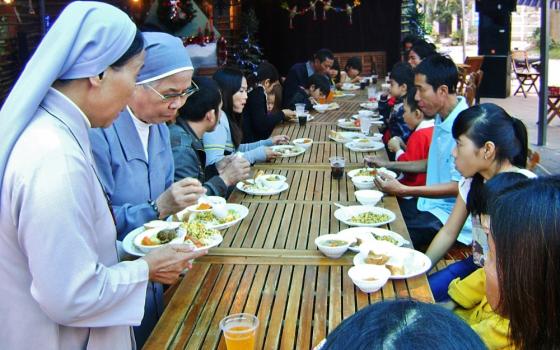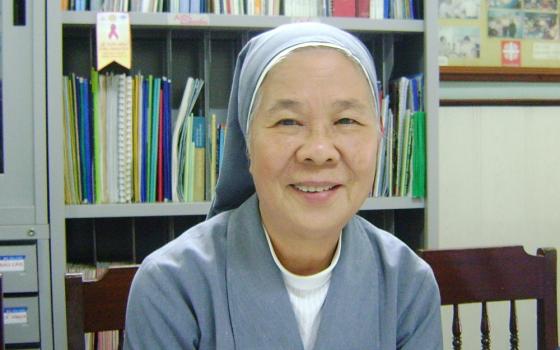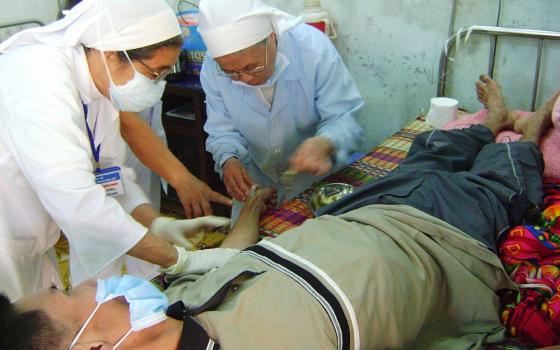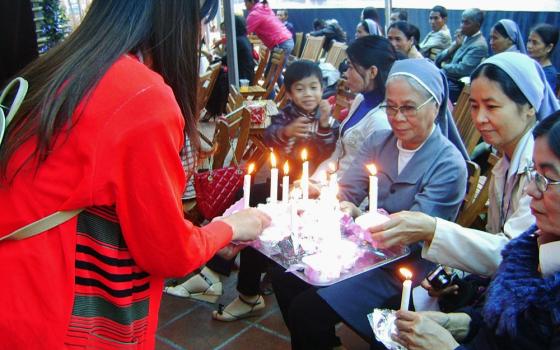Sr. Josephine Huynh Thi Ly, a member of Da Nang Province of Saint Paul de Chartres, is one of the first Catholic nuns invited to give medical treatment to people with HIV/AIDS at the Central Hospital run by the government in Hue City, central Vietnam.
The Catholic church and other local religions were banned from providing health care and education services when the Vietnam War ended nearly 40 years ago. Most of their former facilities were confiscated by the communist government and turned into public hospitals and schools.
For a long time, Catholics were denied work in state-run agencies and organizations. Until now they have not been allowed to take key positions in the government and government organizations.
Sr. Ly, 73, has volunteered to serve people with HIV/AIDS since 1997. Thua Thien Hue province recorded 330 people living with HIV/AIDS, and on average, the hospital treats to 15 such patients a day.
How did you enter the hospital?
Before 1975, I cared for lepers at the Tuberculosis and Leprosy Hospital run by our congregation in the city. After communist forces took control of South Vietnam on April 30, 1975, and the country was unified, the government confiscated our hospital and merged it into the Central Hospital. I was still allowed to serve patients at the hospital until 1995 when lepers were moved to other places.
The hospital started to treat people with HIV/AIDS in 1996. However, hospital officials did not recruit any nurses for more than a year, but finally they invited me to work with HIV/AIDS patients. At the time, people were afraid of being infected with HIV by contact, so they kept away from those patients.
I accepted the hospital officials’ offer because I was used to looking after lepers, and hospital ministry remains one of our missions even though we no longer run hospitals. They also allowed me to wear my habit (on my head) while I work at the hospital.
What is your daily work at the hospital?
As a nurse, I give patients injections and help them take their medication. I feed those who are not able to eat by themselves. I also spend time meeting patients and their relatives, listening to their worries, emotions and hardships, and consoling them.
I invite priests to minister last rites to patients who require them, or I myself baptize dying people without priests. I give Communion to patients.
I serve as a contact person between patients and their relatives who come to me from other places when they need priests. I wear my habit so I am easily recognized as a sister.
After learning of their diagnosis, HIV patients are bitterly disappointed with themselves and very depressed. When they face their last breath, all people including atheists, think about where they are from and what the meaning of their life is. Religious faith gives them moral support so that they die a peaceful death.
What is the difference between you and other nurses?
Two other nuns and I volunteer to serve people with HIV/AIDS without being paid. We look after patients with respect and love, as if they were our relatives, and we especially give them spiritual healing that other nurses cannot. Many patients felt very depressed by discrimination from their communities and had attempted suicide.
We often leave the hospital late, after we are sure that no patients await our help. So we regularly miss lunches at our convent. We also volunteer to fill in for other colleagues on weekends and public holidays so they can enjoy their family life.
What challenges do you face at the hospital?
I have faced major risks from HIV/AIDS patients who are addicted to drugs. Some patients have managed even to get out of the hospital to buy drugs. One drug-addicted patient used a knife to force everyone out of the room. Later the police had to come; they manacled his ankles. I spent three weeks consoling and advising him, and then he calmed down and received treatment.
I once had a needle that was used to inject medicine into a patient jab my finger. At first I was very fearful of being infected with HIV, but I trust in God’s providence.
Patients who are on an IV sometimes go into convulsions that cause blood to spurt onto nurses or for needles to go in their hands.
What else do you do for people with HIV/AIDS?
I had a wedding celebration for a Buddhist man and a Catholic woman at a local volunteer’s house because the man’s family members discriminated against the woman, who was orphaned and suffered HIV. We also gave them medicine for their treatment.
I offer money to patients so they can run some small business for a living.
Some of the other nuns and I bring roses and food to patients at the hospital on Saturdays, and we hold summer camps for patients’ children. We also provide coffins for those who die, hold their funerals and bury them.
As a way to thank our efforts and services, hospital officials visit us and give us flowers on national holidays and the Lunar New Year.
[Joachim Pham is a GSR correspondent based in Vietnam.]



